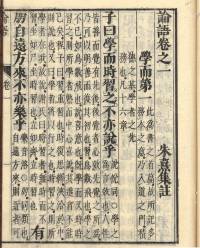Table of Contents
Texts for the reading sessions
Introduction to Lunyu (The Analects)
 The Analects, or Lunyu is the collection of sayings and ideas of the ancient sage Confucius (551–479 BC) and his followers or pupils. It was written by Confucius' followers approximately around 500 BC during the Spring and Autumn (771-476 BC) and the Warring States Period (475-221 BC).
The Analects, or Lunyu is the collection of sayings and ideas of the ancient sage Confucius (551–479 BC) and his followers or pupils. It was written by Confucius' followers approximately around 500 BC during the Spring and Autumn (771-476 BC) and the Warring States Period (475-221 BC).
The Analects has 20 Chapters in total and is one of the most important and influential Confucian classics. Together with the other three volumes of the Four Books, it teaches the basic Confucian ethical concepts including social and ritual propriety, righteousness, loyalty, and filial piety, all centred about the central thought of Confucius – ren ( humanity) , li (proper conduct) and junzi (the proper man).
Notes
<columns 100% 50% >
Lunyu Xue er 1-9, 28/04/12
Lunyu Xue er 8-12, 12/05/12
Lunyu Weizheng in seal script.
<newcolumn>
</columns>
Summaries
Lunyu Wei Zheng 4-8 Summary, 02/06/12
Lunyu Xue Er 8-12 Summary, 12/05/12
Lunyu Xue Er 3-8 Summary, 05/05/12
Lunyu Xue Er 1-2 Summary, 28/04/12
Books and Links
- 四书章句集注-朱熹 Si Shu Zhang Ju Ji Zhu - Zhu Xi (in Chinese)
- The Analects of Confucius, translated by James Legge, 1861.
Other documents
- 关于“夷狄”与“诸夏” - 《论语》《八佾》第五章读后, by Meng Lu. 2012/07/03